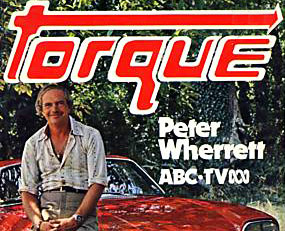Former ABC motoring personality, car racer and driving instructor Peter Wherrett has died of cancer in Newcastle at the age of 72.
Wherrett became a national figure following the success of the ABC’s popular motoring program of the 1970s, Torque, for which he was the host and co-script writer in eight well-received series.
Wherrett’s very opinionated style hit the spot with Australian consumers. At the ABC there were no commercial considerations and this was perfect for his forceful black-and-white approach to car evaluations.Later he presented and co-wrote another ABC show – Marque, a history of the motor car. He was very much a natural as a TV performer.Wherrett’s interest in cars began as a teenager.He ran a successful driving school called Peter Wherrett Advanced Driving and was a tireless campaigner for better driving.He also worked as the technical editor for Racing Car News and wrote about motor sport for the Sydney Morning Herald . Later he filed for Wheels doing road and track tests on racing cars.This led to driving cars competitively, initially in single seaters and then in touring cars.Wherrett’s private life was even more colourful than the one the TV audience saw.In 1986, with his television career uncertain and his personal life in turmoil, Wherrett was twice caught driving under the influence of alcohol, severely impacting on his reputation a motoring expert and champion of road safety.He was married three times. Always honest, he also revealed his interesting penchant for cross dressing.Peter Wherrett is survived his son Steven Wherrett, daughter Jane Whitburn and six grandchildren – three by each of his children.The following is a transcript from the ABC’s GNT Program, broadcast 6.30pm on 27/09/2004
Peter Wherrett began his career as a journalist writing motor sport for the Sydney Morning Herald in 1958.In 1967 he set up Australia’s first post-licence driver training organisation.Peter drove at Bathurst in 1969 for Mazda, in 1970 for Ford and in 1974, ’75 and ’76 for Alfa Romeo.The Australian Broadcasting Corporation approached Ken in 1973 and the resulting program, ‘Torque’ ran for eight years as one of the most successful ABC series ever. ‘Torque’ eventually led to the production of the historical series, ‘Marque’ which was the only history of the car series ever produced for ‘free to air’ television in the world.GEORGE NEGUS: Once upon a time, he was host of the popular ABC motoring show ‘Torque’ back when a brand-new Porsche – would you believe – cost an outrageous $15,000. Peter Wherrett, good to see you.PETER WHERRETT: George, g’day.GEORGE NEGUS: Now, you’ve got to…you’ve got to fix up things for an old non-vehicular person like myself. What the hell does ‘torque’ mean?PETER WHERRETT: Oh…GEORGE NEGUS: I know it’s…PETER WHERRETT: It means literally a ‘twist’.GEORGE NEGUS: Right.PETER WHERRETT: And in fact, the word comes from a twist of metal which the Greeks used as decoration, really.GEORGE NEGUS: So what’s that got to do with…?PETER WHERRETT: Well, twist. The twisting action of the engine is actually the opposite of or an adjunct to the power of the engine.GEORGE NEGUS: I knew that all the time.PETER WHERRETT: I knew. I know.GEORGE NEGUS: I just thought I’d check.PETER WHERRETT: Of course I knew that you knew it.GEORGE NEGUS: Why do you think that program was so popular? Because it was.PETER WHERRETT: It was pretty new as a concept. And everybody was interested in motor cars. And probably still are. But then, particularly, because cars had not been ever on television. And also because I said some pretty outrageous things.GEORGE NEGUS: You did.PETER WHERRETT: People sat at home and said, “Yeah! Get it on!”GEORGE NEGUS: That’s true.PETER WHERRETT: Yeah. I did. I thought they were… I still believe what I said was accurate and truthful. But people hadn’t been brave enough to make the outrageous statements.GEORGE NEGUS: Can you recall anything that you particularly said that you had to live with?PETER WHERRETT: I recall one thing I said about a car which we’ll leave unnamed because I said at the end of the piece, “This car has got hazard warning lights and it’s just as well. I suggest you drive with them on all the time.”(George Negus laughs)(ARCHIVAL FOOTAGE FROM ‘TORQUE’)PETER WHERRETT IN ARCHIVAL FOOTAGE: The first area of disadvantage for the Mini is its back-seat access.PETER WHERRETT IN STUDIO: The manufacturers didn’t like it.GEORGE NEGUS: I can imagine.PETER WHERRETT: No.GEORGE NEGUS: Were you blackballed?PETER WHERRETT: Yeah, yeah. The interesting thing was I said a lot of things which were derogatory. We were giving them a bit of a knock. But if they come up with something good, I’d also say, “This is a really good motor car.”GEORGE NEGUS: Have you always been interested in motor cars?PETER WHERRETT: My parents got their first car when I was 12.GEORGE NEGUS: Right.PETER WHERRETT: And I started to drive it – in private circumstances, of course.GEORGE NEGUS: ‘Cause they were curiosities?PETER WHERRETT: Yeah, it was curiosity. Um, not long after that, I was taken by my mum to my first motor race meeting. And that absolutely captivated me. I said then, “I have to do this one day.”GEORGE NEGUS: Really?PETER WHERRETT: It took me another eight years. But I made it into motor racing. And I made it into journalism before I… I was angry at news…Australian newspapers for not giving motor sport, my sport, reasonable coverage. So I wrote letters to all of them complaining and the news editor of the ‘Sydney Morning Herald’ wrote and said, “Come and see me.” When I saw him, he said, “If you feel so strongly, do it.”GEORGE NEGUS: Good point.PETER WHERRETT: So I did. I started writing for the ‘Sydney Morning Herald’. And I’ve been writing ever since.GEORGE NEGUS: Yep. You were also involved in setting up advanced driving…the whole idea of advanced driving in this country.PETER WHERRETT: Yeah, in 1967, ’68, yeah, we started. Again, that came about coincidentally because some of my friends had said why don’t I run a course to teach people how to race cars. I did that, but I thought, “I can’t teach these people how to drive racing cars. They can’t even drive ordinary road cars.”(George Negus chuckles)PETER WHERRETT: I thought we needed to do something. So, yeah. We set that up and starved to death for three years. But eventually, we…it started to catch on.(ARCHIVAL FOOTAGE OF PETER WHERRETT HOLDING CRASH HELMET, SPEAKING TO MAN)PETER WHERRETT ON ARCHIVAL FOOTAGE: Professor, this rather dreadful-looking crash helmet? What’s all that about?PROFESSOR SID LOVIBOND: This is a means of controlling the visual cues the driver’s getting. When it’s in operation, it’s actually closed for half a second and open for half a second and closed for half a second, open for half a second.(FOOTAGE OF OLD VALIANT CAREENING AROUND OPEN RACE TRACK)GEORGE NEGUS: Exactly what was that all about?PETER WHERRETT: That was Professor Sid Lovibond who…from the Department of Applied Psychology at the University of NSW who was a motoring enthusiast himself and with whom I had some conversation about what is it, is it visual cues or physical cues that tell you your car is getting out of control.PROFESSOR LOVIBOND ON ARCHIVAL FOOTAGE: The idea is we can shift the seat sideways like that.(BUCKET SEAT SLIDES SIDEWAYS, IN TOWARDS THE MIDDLE OF THE CAR)PROFESSOR LOVIBOND: When the driver is taking the corner.PETER WHERRETT IN STUDIO: The trick was to decide when you reacted to what was going on with the car. It was a fabulous experiment.GEORGE NEGUS: It’s very precise and very technical.PETER WHERRETT: Yeah. And it was very, very enlightening.GEORGE NEGUS: Yeah. Would you be tougher than our existing road rules are about all sorts of things, speed, alcohol, age limits…PETER WHERRETT: No, I don’t think I’d be… Oh, age limits…GEORGE NEGUS: ..midlife crises and, retesting?PETER WHERRETT: Yeah, oh, retesting, I would be.GEORGE NEGUS: Would you?PETER WHERRETT: Yeah. It’s crazy that we get a licence at 16 or 17 and nobody wants to see you again until you’re in your 70s or whatever it is.GEORGE NEGUS: Can you lay to rest the urban legend or the urban myth about women drivers?PETER WHERRETT: Mm-hm.GEORGE NEGUS: Toss away the old cliche.PETER WHERRETT: Mmm. OK.GEORGE NEGUS: Are they better or worse?PETER WHERRETT: Yes, they’re better. And demonstrably so. I mean, the number of accidents, collisions and deaths involved with women are much less than they are with men. But I need to make a qualification to that. Um, women are better, provided that they don’t…they avoid crises, uh, that they don’t get themselves into troublesome situations. In a troublesome situation, women do not respond quite as effectively as men do. But women are better drivers than men. And given I have an opportunity to drive with people I don’t know and don’t know how they drive, I’ll take the female driver as my driver any time.GEORGE NEGUS: Absolutely interesting.PETER WHERRETT: Especially cab drivers.GEORGE NEGUS: Really? Women cab drivers.PETER WHERRETT: Oh, they’re great.GEORGE NEGUS: We don’t have that many.PETER WHERRETT: No. If you could ring up and say, “Please send me a woman cab driver,” that’s who I’ll have.





